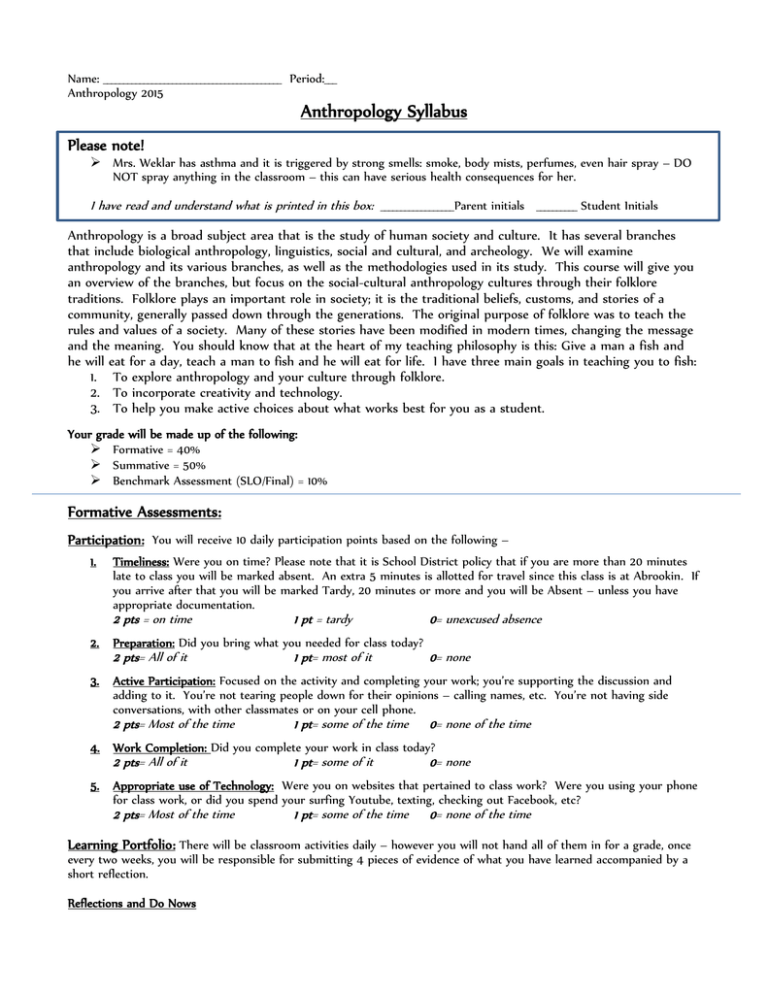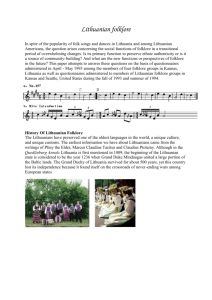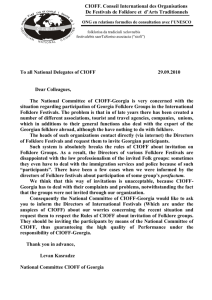File
advertisement

Name: ____________________________________________ Period:___ Anthropology 2015 Anthropology Syllabus Please note! Mrs. Weklar has asthma and it is triggered by strong smells: smoke, body mists, perfumes, even hair spray – DO NOT spray anything in the classroom – this can have serious health consequences for her. I have read and understand what is printed in this box: __________________Parent initials __________ Student Initials Anthropology is a broad subject area that is the study of human society and culture. It has several branches that include biological anthropology, linguistics, social and cultural, and archeology. We will examine anthropology and its various branches, as well as the methodologies used in its study. This course will give you an overview of the branches, but focus on the social-cultural anthropology cultures through their folklore traditions. Folklore plays an important role in society; it is the traditional beliefs, customs, and stories of a community, generally passed down through the generations. The original purpose of folklore was to teach the rules and values of a society. Many of these stories have been modified in modern times, changing the message and the meaning. You should know that at the heart of my teaching philosophy is this: Give a man a fish and he will eat for a day, teach a man to fish and he will eat for life. I have three main goals in teaching you to fish: 1. To explore anthropology and your culture through folklore. 2. To incorporate creativity and technology. 3. To help you make active choices about what works best for you as a student. Your grade will be made up of the following: Formative = 40% Summative = 50% Benchmark Assessment (SLO/Final) = 10% Formative Assessments: Participation: You will receive 10 daily participation points based on the following – 1. Timeliness: Were you on time? Please note that it is School District policy that if you are more than 20 minutes late to class you will be marked absent. An extra 5 minutes is allotted for travel since this class is at Abrookin. If you arrive after that you will be marked Tardy, 20 minutes or more and you will be Absent – unless you have appropriate documentation. 2 pts = on time 1 pt = tardy 0= unexcused absence 2. Preparation: Did you bring what you needed for class today? 2 pts= All of it 1 pt= most of it 0= none 3. Active Participation: Focused on the activity and completing your work; you’re supporting the discussion and adding to it. You’re not tearing people down for their opinions – calling names, etc. You’re not having side conversations, with other classmates or on your cell phone. 2 pts= Most of the time 1 pt= some of the time 0= none of the time 4. Work Completion: Did you complete your work in class today? 2 pts= All of it 1 pt= some of it 0= none 5. Appropriate use of Technology: Were you on websites that pertained to class work? Were you using your phone for class work, or did you spend your surfing Youtube, texting, checking out Facebook, etc? 2 pts= Most of the time 1 pt= some of the time 0= none of the time Learning Portfolio: There will be classroom activities daily – however you will not hand all of them in for a grade, once every two weeks, you will be responsible for submitting 4 pieces of evidence of what you have learned accompanied by a short reflection. Reflections and Do Nows Summative Assessments Unit Projects: Each Unit will have a project attached to it. Unit Reflections: Each unit will have a reflection that will consist of short answer questions that are based on the course material and your opinion. Final Project. Course outline: What is Anthropology? Cultural, biological, archeology, linguistic (areas of study & methodologies) o Human Evolution – Homo Sapiens evolving family tree o Archeology o Language and Culture Cultural Taboos Levi-Strauss Cultural Survey – Focus on Haiti (Once on this Island) o How do anthropologists study culture? o Elements of Culture Elements of Folklore o Research and create study guides for elements of Haitian culture History Indigenous people French colonization and its effects Food Art Dress Mythology and Folk tales Folklore – Personal Folklore survey o Personal folklore: Where I'm From – Intro to digital storytelling European fairytales – Changing morays and values o The dangers of Disney Cinderella The Little Mermaid Rapunzel o Modernize a fairytale Urban legends – Why are they told? Window into Modern Values? o The Vanishing Hitchhiker, etc. o The Legend of Sleepy Hollow o Collect local folklore Sheridan Hollow Oakwood Cemetary o Write your own urban legend Final project: Folklore Anthology Course goals: To create a collection or anthology of personal folklore. To create or revise a folk tale, myth or legend To examine the morays and values of our families, communities, and society





